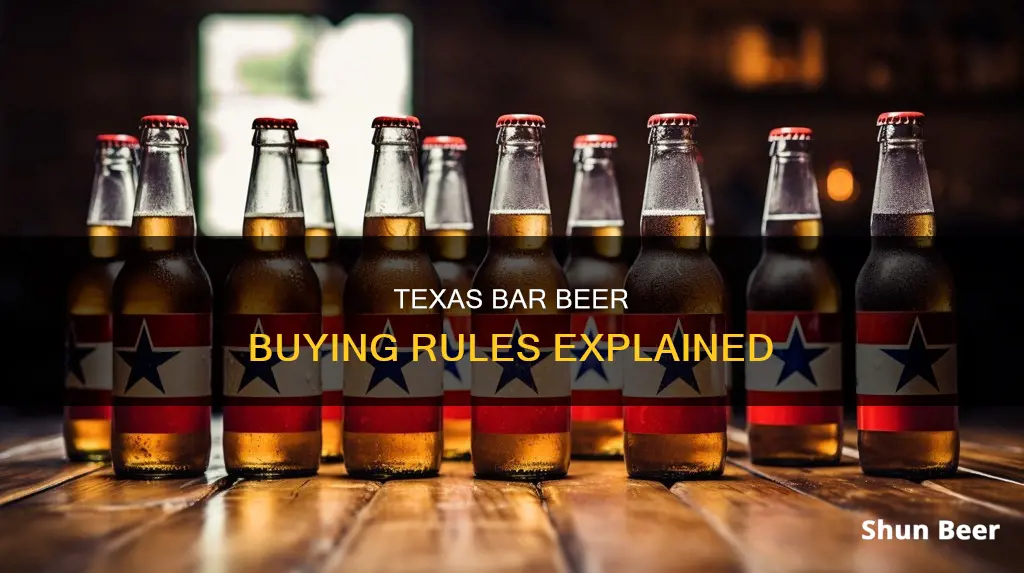
Texas has some of the most heavy-handed alcohol regulations in the United States. The state's alcohol laws are complex and confusing, and understanding them is crucial to avoid trouble with the law. One of the most notable aspects of Texas's alcohol regulations is the restriction on the days and hours when alcohol can be sold. Texas is one of the few remaining states with blue laws, which limit the sale of certain goods on specific days of the week. While these laws have evolved over time, they continue to regulate the sale of alcohol in the state.
In Texas, liquor stores, also known as package stores, are prohibited from operating on Sundays, Thanksgiving Day, Christmas Day, and New Year's Day. They are allowed to sell liquor from 10 am to 9 pm on the other days of the week. On the other hand, grocery and convenience stores can sell beer and wine from 7 am to midnight, Monday to Friday, and from 7 am to 1 am on Saturdays. On Sundays, beer and wine sales in these stores are permitted from 10 am to midnight.
Bars and restaurants in Texas have more flexibility in their operating hours. They can serve alcohol from 7 am to midnight, Monday to Friday, and from 7 am to 1 am on Saturdays. On Sundays, they can start serving alcohol at 10 am if it is served with food, or at noon without food. Certain bars and restaurants with a late hours permit can serve alcohol until 2 am any night of the week.
The state's alcohol regulations also vary based on the type of business and the specific licenses and permits they hold. For example, wineries have different operating hours than liquor stores, and some establishments may have restrictions on the percentage of alcohol in the beverages they sell.
In summary, Texas has strict and complex laws governing the sale and service of alcohol. These laws determine when and where alcohol can be purchased and consumed, and they are essential to understand for anyone involved in the industry or planning to visit the state.
| Characteristics | Values |
|---|---|
| Can a bar in Texas buy beer from a store? | No, beer can only be purchased from wholesalers. |
| Days bars can sell alcohol | Monday-Saturday |
| Hours bars can sell alcohol | 7am-midnight (Mon-Fri), 7am-1am (Sat), 12pm-midnight (Sun) |
| Days liquor stores can sell alcohol | Monday-Saturday |
| Hours liquor stores can sell alcohol | 10am-9pm |
| Days grocery and convenience stores can sell alcohol | Monday-Sunday |
| Hours grocery and convenience stores can sell alcohol | 7am-midnight (Mon-Fri), 7am-1am (Sat), 10am-midnight (Sun) |
What You'll Learn
- Texas alcohol laws are complex and confusing
- Liquor stores are closed on Sundays, Thanksgiving, Christmas, and New Year's Day
- Grocery and convenience stores can sell beer and wine from 7 am to midnight, Monday to Friday
- Beer and wine sales are allowed in stores from 10 am to midnight on Sundays
- Bars and restaurants can serve alcohol from 7 am to midnight, Monday to Saturday

Texas alcohol laws are complex and confusing
One of the most notable complexities is the restriction on Sunday sales of bottled liquor. Texas is one of the few remaining states with "blue laws," which limit the sale of certain goods on specific days of the week. While restaurants, bars, and grocery and convenience stores can sell alcohol on Sundays, liquor stores are prohibited from doing so. This means that liquor sales are restricted to Monday through Saturday, from 10 am to 9 pm, and liquor stores must remain closed on Sundays, Thanksgiving Day, Christmas Day, and New Year's Day.
Another unique aspect of Texas alcohol laws is the "consanguinity exception," which allows liquor store owners to expand their business beyond five permits if they have family members in the liquor store business. This exception has been criticised as unconstitutional, as it favours certain individuals without a rational basis.
The state also has strict rules regarding the types of businesses that can sell alcohol. For example, liquor can only be purchased from specific liquor stores, while grocery stores, drug stores, and convenience stores can only sell beer and wine. Additionally, Texas is the only state that bars publicly traded corporations from holding liquor permits, a regulation that has faced legal challenges.
The hours of operation for alcohol sales vary depending on the type of establishment. Grocery and convenience stores can sell beer and wine from 7 am to midnight, Monday through Friday, 7 am to 1 am on Saturdays, and 10 am to midnight on Sundays. Bars and restaurants with a "late hours" permit can serve alcohol until 2 am any night of the week, while those without the permit must stop serving by midnight on weekdays and 1 am on Saturdays.
Texas alcohol laws also include provisions for alcohol-to-go options, which were made permanent after initially being introduced as temporary waivers during the COVID-19 crisis. These laws allow Mixed Beverage and Private Club permit holders to sell alcohol for customer pickup or delivery, providing they meet certain requirements.
The complexity of Texas alcohol laws can be attributed to various factors, including their long history, multi-level regulation, and the involvement of large, complex industries. The laws have evolved over time to meet the needs and sensibilities of Texans, resulting in a comprehensive set of regulations that can be challenging to navigate.
Louisiana Beer Laws: When Can You Buy?
You may want to see also

Liquor stores are closed on Sundays, Thanksgiving, Christmas, and New Year's Day
Texas has some of the most stringent alcohol regulations in the country, and its liquor laws are no exception. Under Texas law, liquor stores are prohibited from operating on Sundays and major holidays such as Thanksgiving, Christmas, and New Year's Day. This means that if you're planning to stock up on liquor for a holiday or a Sunday, you'll need to plan ahead as these are the days when liquor stores are closed.
The origins of these laws, often referred to as "blue laws," date back to the 17th and 18th centuries in some American colonies. They were designed to protect Sunday as a day of worship and encouraged church attendance by limiting commercial activities. Over time, these laws have evolved and, in Texas, they now specifically apply to the sale of liquor.
In Texas, liquor stores are typically allowed to operate from 10 a.m. to 9 p.m., Tuesday through Saturday. However, on Sundays and the aforementioned holidays, these stores must remain closed to the public. This restriction also applies if Christmas or New Year's Day falls on a Sunday, in which case the stores are required to close the following Monday as well.
It's important to note that these restrictions do not apply to the sale of beer and wine. While there are separate laws governing the sale of these beverages, they can generally be purchased from grocery and convenience stores that are open on Sundays and holidays.
The impact of these laws is significant for both consumers and liquor store owners. Consumers need to plan their purchases accordingly, especially if they are stocking up for a holiday celebration. For liquor store owners, the restrictions mean they have limited operating hours and days, which can affect their business strategies and revenue streams.
While there have been efforts to amend these laws, as of 2024, the regulations remain in place. Texas' liquor laws stand out as an interesting example of how historical practices can persist and continue to shape modern-day policies and cultural norms.
Buying Beer: What You Need to Know
You may want to see also

Grocery and convenience stores can sell beer and wine from 7 am to midnight, Monday to Friday
Texas has strict laws concerning alcohol sales and service, and these vary depending on the type of alcohol, the day of the week, and the type of establishment.
These stores can only sell wine with an alcohol content of up to 14% by volume, unless they have an additional permit to sell wine above this percentage, in which case, different hours may apply. For example, a wine-only package store with a beer license is prohibited from selling wine with an alcohol content exceeding 17% on Sundays or past 10 pm on any day.
Liquor stores, on the other hand, are not permitted to operate on Sundays, and can only remain open from 10 am to 9 pm on other days of the week. They must also close on Thanksgiving Day, Christmas Day, and New Year's Day. If Christmas or New Year's Day falls on a Sunday, they must remain closed the following Monday.
It is important to note that these laws can be confusing and are subject to change. Texas has what are known as blue laws, which prohibit the sale of certain goods on certain days of the week. While many of these laws have been repealed, restrictions on alcohol sales remain.
Additionally, some counties or municipalities may have separate alcohol laws that are enforced on top of the state laws, further adding to the complexity.
Hofbrauhaus Beer: Where to Buy and Enjoy It
You may want to see also

Beer and wine sales are allowed in stores from 10 am to midnight on Sundays
Texas has some of the most stringent alcohol regulations in the United States, largely due to the influence of special interest groups. The state's alcohol laws are governed by the Texas Alcoholic Beverage Commission (TABC).
Firstly, while beer and wine can be sold from stores, Texas law differentiates between “on-premise” and “off-premise” sales. On-premise sales refer to purchases made at a restaurant or bar for consumption at that location, while off-premise sales refer to purchases made for consumption elsewhere, such as at home. Voter approval is required for both types of sales.
Secondly, Texas is one of the few remaining states with "blue laws", which restrict the sale of certain goods on specific days. While restaurants, bars, and grocery and convenience stores can sell beer and wine on Sundays, liquor stores are prohibited from operating on Sundays and can only be open from 10 am to 9 pm on other days. They must also remain closed on New Year's Day, Thanksgiving Day, and Christmas Day.
Additionally, there are age restrictions for employees working in establishments that sell alcohol. For off-premise sales, there is no age restriction for employees in most grocery or convenience stores. However, employees of liquor stores must be 21 or older. For on-premise sales, employees must be 18 or older.
It is also important to note that Texas has unique laws regarding the ownership of liquor stores. Theoretically, liquor stores are limited to five permits. However, there are two exceptions to this rule. Firstly, those who owned a liquor store before May 1, 1949, are not subject to this limit. Secondly, the "consanguinity exception" allows permit holders with a parent, child, or sibling in the liquor business to join forces and obtain an unlimited number of permits.
Non-Alcoholic Beer Laws: States Where Minors Can Buy
You may want to see also

Bars and restaurants can serve alcohol from 7 am to midnight, Monday to Saturday
Texas has strict laws concerning alcohol sales and service, with varying hours for on-premise and off-premise consumption. On-premise license or permit holders, such as bars and restaurants, can serve alcohol from 7 am to midnight, Monday to Friday, and 7 am to 1 am on Saturdays. On Sundays, they can serve alcohol from noon to midnight, or from 10 am if served with food.
These establishments can also apply for a "late hours" permit, allowing them to serve alcohol until 2 am any night of the week. Additionally, hotel bars can serve registered hotel guests at any time of day. It is important to note that the hours for serving alcohol in bars and restaurants are the same for beer, wine, liquor, and mixed drinks.
For off-premise license or permit holders, such as grocery and convenience stores, the hours for selling alcohol differ. They can sell beer and wine from 7 am to midnight, Monday to Friday, and 7 am to 1 am on Saturdays. On Sundays, they can sell beer and wine from 10 am to midnight.
Liquor stores, also known as package stores, have different operating hours. They are open from 10 am to 9 pm, Monday to Saturday, and are closed on Sundays, Thanksgiving Day, Christmas Day, and New Year's Day. If one of these holidays falls on a Sunday, the store must remain closed the following Monday.
Wineries, which offer a mix of on-premise and off-premise sales, can operate from 8 am to midnight, Monday to Saturday, and 10 am to midnight on Sundays.
It is worth noting that Texas has what are known as "blue laws," which restrict the sale of certain goods on specific days. These laws were originally designed to protect Sunday as a day of worship by limiting commercial activities. While most blue laws were repealed in 1985, restrictions on alcohol sales remain in place, with liquor stores being prohibited from selling on Sundays.
Buying Non-Alcoholic Beer in California: The 18-Year-Old's Guide
You may want to see also
Frequently asked questions
No, bars in Texas cannot buy beer from a store. They must buy it from a distributor.
Monday to Friday: 7 am to midnight; Saturday: 7 am to 1 am; Sunday: noon to midnight (10 am to noon only with the service of food).
No, consumption of alcohol outside of drinking establishments is prohibited.







